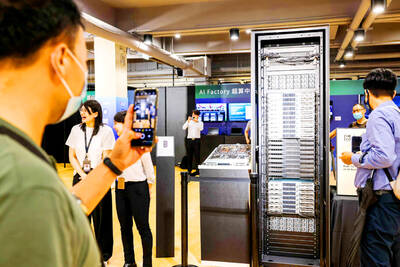Taiwan’s Acer Inc (宏碁) and Asustek Computer Inc (華碩), the world’s fourth and fifth-largest notebook makers, may face more market share loss this quarter after their shipments declined significantly last quarter, while Dell Inc is looking serious about returning to the personal computer (PC) market.
In the three months ending on Monday last week, Acer saw its PC shipments decline 22.6 percent year-on-year to 6.67 million units with a global market share of 8.3 percent, while Asustek reported a 22.5 percent decline in shipments to 4.92 million units for a 6.1 percent market share, Gartner Inc said on Wednesday.
ANNUAL
Meanwhile, the latest data compiled by the International Data Corp (IDC) on Wednesday showed Acer suffered a 34.5 percent annual decline in shipments to 5.48 million units and Asustek had a 34.1 percent fall to 4.21 million units in the quarter.
The two firms held a 6.7 percent and a 5.2 percent market share in IDC’s tallies respectively.
“Acer and Asustek are the worst performers in the third quarter, hurt by weakness in the segments where they are heavily exposed: consumer, Western Europe and emerging markets,” head of technology research at CLSA Asia-Pacific Markets Nicolas Baratte wrote in a note yesterday.
LIMITING FACTORS
Despite their efforts in developing hybrid devices and their emphasis on new designs, the lack of corporate PC portfolios at Acer and Asustek has limited their growth, leading Taipei-based Topology Research Institute (拓墣產業) to predict the two firms would register a decline of more than 20 percent in shipments this year.
Citigroup Global Markets also believes Dell Inc’s recent introduction of a new family of tablets and new laptops suggests that the US PC brand still has no plan to exit the industry anytime soon and it will reap share gains at the expense of Acer and Asustek.
On Wednesday last week, Dell introduced a slew of attractive new notebook and tablet models, which includes a 2-in-1 Ultrabook.
Citigroup analyst Wei Chen (陳思維) said such product offerings made clear that Dell’s intention to get back into the PC market and the company’s PC strategy could renew pricing pressure in the consumer PC segment, to which Acer and Asustek have large exposure.
“We believe that Asustek gained share in the consumer PC segment in 2011-2012 as Dell and HP retreated. With Dell reverting to a more aggressive PC strategy, easy share gains by Asustek and Acer will likely become a thing of the past,” Chen said in a note on Wednesday.
UNDERPERFORM
Shares of Acer have dropped 21.23 percent since the beginning of the year and those of Asustek have fallen 29.1 percent, both underperforming the 2.95 percent increase of the bellwether electronic stocks over the same period, the Taiwan Stock Exchange data showed.
Acer ended 0.5 percent lower at NT$19.85 on Wednesday, while Asustek was down 1.49 percent to NT$231.5.

LIMITED IMPACT: Investor confidence was likely sustained by its relatively small exposure to the Chinese market, as only less advanced chips are made in Nanjing Taiwan Semiconductor Manufacturing Co (TSMC, 台積電) saw its stock price close steady yesterday in a sign that the loss of the validated end user (VEU) status for its Nanjing, China, fab should have a mild impact on the world’s biggest contract chipmaker financially and technologically. Media reports about the waiver loss sent TSMC down 1.29 percent during the early trading session yesterday, but the stock soon regained strength and ended at NT$1,160, unchanged from Tuesday. Investors’ confidence in TSMC was likely built on its relatively small exposure to the Chinese market, as Chinese customers contributed about 9 percent to TSMC’s revenue last

With this year’s Semicon Taiwan trade show set to kick off on Wednesday, market attention has turned to the mass production of advanced packaging technologies and capacity expansion in Taiwan and the US. With traditional scaling reaching physical limits, heterogeneous integration and packaging technologies have emerged as key solutions. Surging demand for artificial intelligence (AI), high-performance computing (HPC) and high-bandwidth memory (HBM) chips has put technologies such as chip-on-wafer-on-substrate (CoWoS), integrated fan-out (InFO), system on integrated chips (SoIC), 3D IC and fan-out panel-level packaging (FOPLP) at the center of semiconductor innovation, making them a major focus at this year’s trade show, according

DEBUT: The trade show is to feature 17 national pavilions, a new high for the event, including from Canada, Costa Rica, Lithuania, Sweden and Vietnam for the first time The Semicon Taiwan trade show, which opens on Wednesday, is expected to see a new high in the number of exhibitors and visitors from around the world, said its organizer, SEMI, which has described the annual event as the “Olympics of the semiconductor industry.” SEMI, which represents companies in the electronics manufacturing and design supply chain, and touts the annual exhibition as the most influential semiconductor trade show in the world, said more than 1,200 enterprises from 56 countries are to showcase their innovations across more than 4,100 booths, and that the event could attract 100,000 visitors. This year’s event features 17

Hon Hai Precision Industry Co (鴻海精密), which assembles servers for Nvidia Corp, yesterday said that revenue last month rose 10.61 percent year-on-year, driven by strong growth in cloud and networking products amid continued front-loading orders for artificial intelligence (AI) server racks. Consolidated revenue expanded to NT$606.51 billion (US$19.81 billion) last month from NT$548.31 billion a year earlier, marking the highest ever in August, the company said in a statement. On a monthly basis, revenue was down 1.2 percent from NT$613.86 billion. Hon Hai, which is also a major iPhone assembler, added that its electronic components division saw significant revenue growth last month, boosted